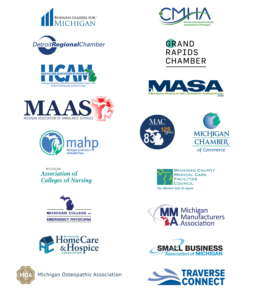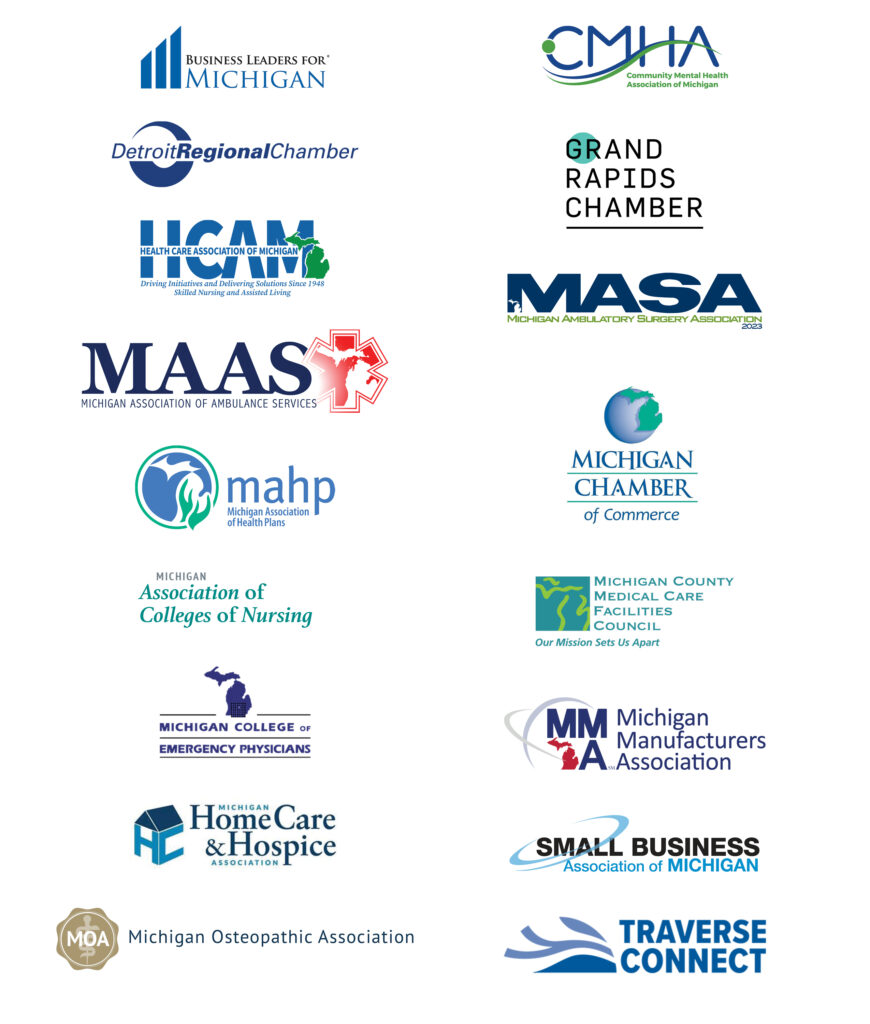
A diverse coalition of healthcare, business and advocacy organizations published a letter to members of the Michigan Legislature today opposing the proposed House Bills 4550-4552 and Senate Bills 334-336, which threaten to put patient care at risk across Michigan.
“These partners from a broad collection of industries all agree imposing a one-size-fits-all legislative mandate to hospital nurse staffing will harm patients and severely restrict access to care in Michigan communities,” said Brian Peters, CEO of the Michigan Health & Hospital Association. “Our nurses, patients and communities deserve more than political posturing that puts healthcare access at risk.”
The proposed bills would mandate one-size-fits-all nurse staffing ratios for all Michigan hospitals, which would not solve existing staffing shortages, as evidenced in other states that have tried this policy. In California, which has had legislatively mandated staffing ratios for over two decades, the state still faces a shortage of 40,000 RNs. Additionally, Michigan outperforms California in hospital quality, as Michigan has both a higher percentage of 4- and 5-star hospitals than California (49% to 35.3%) and a lower percentage of 1- and 2-star hospitals (18.4% to 38.7%), according to CMS Care Compare Hospital Overall Star Ratings.
The United States is facing a national nurse shortage issue, exacerbated by the aging nursing workforce, as many experienced nurses approach retirement. Currently, 32.3% of licensed RNs in Michigan are 55 years of age or older and nearly 8,500 open nursing positions exist statewide. A survey of 109 Michigan hospitals conducted in July 2023 shows Michigan is at risk of losing up to 5,100 hospital beds across the state if this legislation is implemented. This total represents 23% of Michigan’s overall statewide hospital bed capacity and is equivalent to closing all hospitals north of Grand Rapids and Flint.
The coalition emphasizes that mandatory nurse staffing ratios have a broader impact beyond hospitals alone, affecting all healthcare providers’ ability to hire nurses. With a finite pool of available RNs, nursing homes, rehabilitation facilities, physician practices and other healthcare settings will experience increased difficulty in recruiting and hiring nurses, especially as hospitals compete for the same talent pool.
“The entire healthcare sector is facing historic workforce shortages,” said Melissa Samuel, Health Care Association of Michigan President/CEO. “We all need more nurses. Unfortunately, these bills exacerbate the problem and fail to offer meaningful solutions.”
The potential impact to the business community is significant. Data collected from hospitals indicates the proposed ratios could increase healthcare costs by over $1 billion, impacting economic development and employers.
Recent EPIC-MRA polling of Michigan voters indicates that 82% do not believe the government should mandate one-size-fits-all nurse-to-patient staffing ratios in every hospital, and if the bills were to become law, 83% of Michigan voters would be concerned about their ability to receive care, or the wait times, in a Michigan hospital emergency room.
The coalition supports the following alternative solutions to address the nurse staffing shortages:
- Join the Nurse Licensure Compact: Bring Michigan into the national Nurse Licensure Compact to reduce barriers for out-of-state nurses to practice in Michigan immediately, joining 41 other jurisdictions across the country.
- Expand Michigan Reconnect Eligibility: Lower the age requirement to 18 and older, encouraging more individuals to pursue nursing careers.
- Funding Innovative Approaches to Workplace Violence Prevention in Healthcare Settings: This complements the passage of House Bills 4520 and 4521 that increase penalties for violence committed against healthcare workers and would make the nursing profession more attractive by addressing safety concerns.
To date, Michigan hospitals, health systems and other healthcare providers have focused on addressing staffing shortages by implementing various measures, including increased compensation, partnerships with post-secondary education institutions, emotional well-being support, modernizing scope of practice rules and recruitment awareness campaigns such as MI Hospital Careers.
The coalition includes the following organizations, and joins nursing organizations such as the American Nurses Association – Michigan and Michigan Organization for Nursing Leadership in opposing legislatively mandated nurse staffing ratios:
- Business Leaders for Michigan
- Community Mental Health Association of Michigan
- Detroit Regional Chamber
- Grand Rapids Chamber
- Health Care Association of Michigan
- Michigan Ambulatory Surgery Association
- Michigan Association of Ambulance Services
- Michigan Association of Colleges of Nursing
- Michigan Association of Health Plans
- Michigan Chamber of Commerce
- Michigan College of Emergency Physicians
- Michigan County Medical Care Facilities Council
- Michigan Health & Hospital Association
- Michigan HomeCare & Hospice Association
- Michigan Manufacturers Association
- Michigan Osteopathic Association
- Small Business Association of Michigan
- Traverse Connect
To learn more about the impact of the proposed legislation on care in Michigan, visit www.mha.org/issues-advocacy/key-issues/nurse-staffing-ratios.


